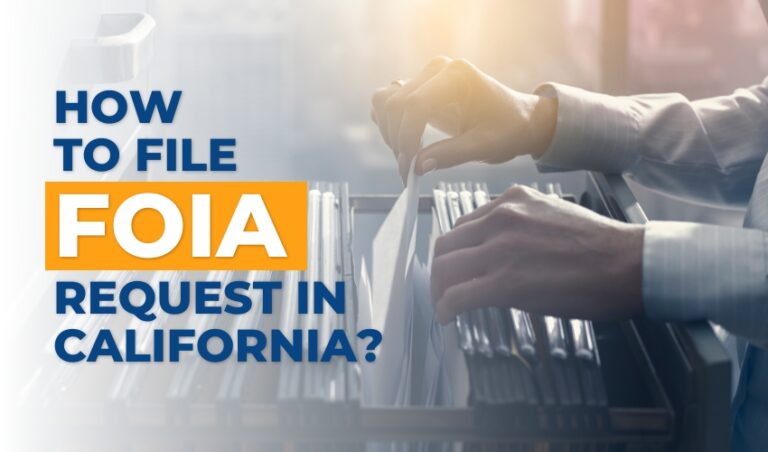Key Points
- The Freedom of Information Act is a tool that ensures the right of people to access useful information that does not pose a threat to public safety. This is created for the purpose of accountability and maintaining transparency.
- Nine exemptions and three exclusions have been put in place that prevent the public from accessing information through the FOIA.
- To obtain such records, you may work with an attorney in California who can guide you on the steps to take, from how to request records as well as how to receive greater access. They may also answer questions you may have regarding the process of seeking such records.
What Is FOIA And How Can You Make A FOIA Request?
The Freedom of Information Act, also known as FOIA, is a federal law that has been enacted in the United States of America since 1967. It is a guarantee that the state will provide full or partial disclosure of its activities in order to let its people know of its activities. The FOIA also mandates government agencies to post certain information which includes commonly requested records that must be made public.
The History of FOIA
It was written by a former U.S. House of Representative John E. Moss in California who, at the time, was chairman of the House of Government Information Subcommittee. The process of taking the FOIA to Congress took more than a decade as it was faced with initial opposition prior to its passing. Finally, on July 4, 1966, the bill was enacted into a law that took effect one year after its passing which was on July 4, 1967.
Since then, the law has been amended multiple times. It was amended in 1974 as part of the Privacy Act of 1974. This was done following the Watergate scandal and former President Richard Nixon’s resignation. Later, it was amended once again in 1976 as part of the Government in the Sunshine Act. Further changes were made in 1982 and 1986 and in the years 1995 to 1999, President Clinton expanded the information subjected to FOIA to include previously classified national security documents that are more than 25 years old and can be considered historical milestones for national archives across the country.
The FOIA was subsequently amended in the years 1996, 2001, 2002, 2007, 2009, and in 2010. All of these were done in response to the signs of the time as the law needed to adapt to how society looked during that period.
FOIA: A Vital Part of Democratic Processes And Federal Agencies
The FOIA is a tool that holds government agencies accountable. It can serve as a means of checks and balances because federal agencies are now required to disclose information to the public. As the champion of democracy in the modern world, the use of FOIA in the United States empowers its people with the ability to access information so that they can “get in the know” about the things our government does. As a result, government agencies are now incentivized to do their jobs better because they are always under public scrutiny due to the FOIA.
The United States Supreme Court has elaborated that “the basic purpose of FOIA is to ensure an informed citizenry, vital to the functioning of a democratic society, needed to check against corruption and to hold the governors accountable to the governed.” This means that they saw the need to pass the bill into law because the United States is a government of the people, by the people, and for the people. The FOIA only serves as a means to fully exercise that function.

Contentions Against the FOIA
Like all legislation, the FOIA has been met with challenges and contentions. No law is perfect in this world, but one function of governance has always been about requiring people to give up certain liberties so that it can better protect its people. We do not live in a state of anarchy where everyone is allowed to harm one another and do whatever they want to do.
In the same manner, however, the government owes us its protection and transparency. We do not give up some of these liberties for nothing; everyone deserves a government that is not corrupt, that serves their people’s interest, and that allows their people to express their disagreements freely without silencing them.
One popular disagreement that is constantly brought up is the burden of cost to keep the FOIA. People’s tax money is used to keep these FOIA agencies afloat. Another disadvantage is that the FOIA can be utilized maliciously and can be subject to abuse and misuse. Nefarious people will take advantage of the FOIA to further their evil intentions. Other known contentions against the FOIA are concerns regarding privacy, administrative burden, and national security. However, some of these concerns have been remedied by the exclusions and exemptions to the FOIA.
Who can exercise the FOIA?
Any person who files a request for information from a certain agency will be able to exercise the FOIA. This is because this information is considered to be public records, so anyone who makes a reasonable request will be able to file for access to information per the FOIA. However, these provisions are not only applicable to citizens of the United States. In fact, foreigners are also able to get hold of these public records if they go through the appropriate channels to request access.
What Are The Exemptions to the Rule When You Make A FOIA Request?
Certain provisions protect access to certain information to protect other constituents from having their rights violated due to unwarranted invasion of their personal privacy, trade secrets, and other information protected by the Privacy Act. The FOIA also allows agencies to withhold information if its release would harm the general public or if it is reasonably expected to interfere with law enforcement activities.
Specifically, there are nine exemptions that have been enumerated that allow the agencies to deny your FOIA requests for certain information.
- Exemption 1: Information that is classified to protect national security.
- Exemption 2: Information related solely to the internal personnel rules and practices of an agency.
- Exemption 3: Information that is prohibited from disclosure by another federal law.
- Exemption 4: Trade secrets or commercial or financial information that is confidential or privileged.
- Exemption 5: Privileged communications within or between agencies, including those protected by the:
- Deliberative Process Privilege (provided the records were created less than 25 years before the date on which they were requested)
- Attorney-Work Product Privilege
- Attorney-Client Privilege
- Exemption 6: Information that, if disclosed, would invade another individual’s personal privacy.
- Exemption 7: Information compiled for law enforcement purposes that:
- 7(A). Could reasonably be expected to interfere with enforcement proceedings
- 7(B). Would deprive a person of a right to a fair trial or an impartial adjudication
- 7(C). Could reasonably be expected to constitute an invasion of personal privacy
- 7(D). Could reasonably be expected to disclose the identity of a confidential source
- 7(E). Would disclose techniques and procedures for law enforcement investigations or prosecutions, or would disclose guidelines for law enforcement investigations or prosecutions if such disclosure could reasonably be expected to risk circumvention of the law
- 7(F). Could reasonably be expected to endanger the life or physical safety of any individual
- Exemption 8: Information that concerns the supervision of financial institutions.
- Exemption 9: Geological information on wells.
Another way FOIA requests may get rejected is by virtue of exclusions. There are three exclusions that have been declared that protect certain information from being accessed publicly.
- The first exclusion protects information where there is an involvement of an ongoing criminal investigation and the target of the investigation is not aware that it is ongoing and it can be reasonably foreseen that information disclosure will interfere with law enforcement actions.
- The second exclusion involves law enforcement agencies and is aimed at protecting informants. The public is not allowed to access informant records when the informant status has not been officially confirmed yet. This provides them a shield of protection that would otherwise endanger them should the information be accessed easily.
- Finally, the third exclusion is limited to the Federal Bureau of Investigation also known as the FBI. It aims to safeguard existing foreign intelligence and counterintelligence, as well as international terrorism records when these records are considered to be classified.
FOIA Requests in California
Each state in the U.S. has certain laws that govern access to information and public records. These laws are commonly known as public records law, open records law, or FOIA laws after the previously explained Freedom of Information Act of 1966.
For the State of California, the law that deals with access to these public records is known as the California Public Records Act. Under this law, it is stipulated that any person in the state has the right to request access to this information, provided that the information is subject to FOIA and does not violate the above mentioned exemptions and exclusions. California is one out of 41 states that does not require individuals who request the information to be residents of the state. Section 7920.520 of the California Public Records Act states that people who may request “includes any natural person, corporation, partnership, limited liability company, firm, or association.”
For the requisition of these public records, one can opt to do a FOIA request. However, there is no specific method that is required for you to do so that is stipulated in the California Public Records Act. Therefore, requests for access to information should be made directly to the federal agencies involved themselves. No special forms are required to be submitted, and in most cases, no fees are required as well for the initial request. However, should fees be collected, those who are in charge of the FOIA request of that company will notify you.
Requests can be made in writing i.e. through mail, or they can also be made electronically through email and fax. This can be made personally, or through an attorney if the information you are asking for can be pertinent to a case you may be going through.

Conclusion On How To Request Access To FOIA
The Freedom of Information Act is an essential tool created by the government in pursuit of transparency and accountability. It encourages people to stay informed about what the government is doing so they can get involved in issues that affect them. Certain exemptions are in place that impede access, however, these exemptions are created for the protection of people as well. FOIA requests are used for whatever purpose it may serve an individual i.e. research, personal interest, or even in litigation. If you have any questions, book a free consultation with a personal injury attorney today.






